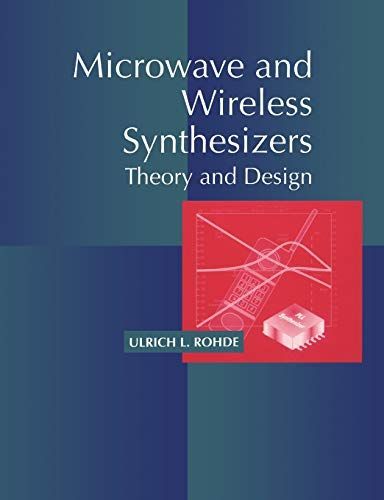
Microwave and Wireless Synthesizers Theory and Design
Over the past decade, great strides have been made in the technology of microwave oscillators and synthesizers, with digital frequency synthesizers in particular attracting much attention. These synthesizers are now being used in virtually all modern signal generators and radio communication equipment. Until now, however, detailed information about their design has been hard to come by-much of it scattered through journal articles-and most books on the subject have taken a primarily theoretical approach. Enter Microwave and Wireless Synthesizers-the first book to emphasize both practical circuit information from RF to millimeter-wave frequencies and up-to-date theory. Based on course material taught by author Ulrich L. Rohde at George Washington University and recent work done by the author at Compact Software, Inc. and Synergy Microwave Corporation, this volume is a complete revision and update of Rohde's landmark text, Digital PLL Frequency Synthesizers: Theory and Design. While it provides all the necessary theory and formulas, it also offers an in-depth look at the practical side of the phase-lock loop (PLL) in synthesizers-including special loops, loop components, and practical circuits-material that is not available in any other book. Rohde explains loop fundamentals, demonstrates the linear approach to oscillator phase noise, discusses the digital direct synthesizer technique, addresses low noise oscillator design, and provides insight into the role and design of crystal oscillators, mixers, phase/frequency discriminators, wideband high-gain amplifiers, programmable dividers, and loop filters. He goes on to cover conventional multiloop synthesizers and survey existing state-of-the-art microwave synthesizer applications. Extensive appendices review the mathematics of useful functions and various applications, including even the complex nonlinear theory of noise in large signal systems such as mixers and oscillators. Microwave and Wireless Synthesizers allows anyone with a PC running either Windows 3.11 or Windows NT to explore real-world design. It uses programs for the solution of digital phase-lock loop systems, tabulates the results, and shows how Bode diagrams are determined by the computer's graphic capabilities. It also includes examples using commercially available linear and nonlinear CAD programs to provide accurate evaluation and optimization of oscillators and other useful circuits and many practical charts. For companies involved in test and communication equipment, this book reduces design and research costs by providing a large number of proven circuits and expediting the design process. It is also an outstanding senior/graduate level textbook for electrical engineering students and an invaluable resource for practicing engineers, senior engineers, and managers who would like to be able to evaluate new trends and techniques in the field.